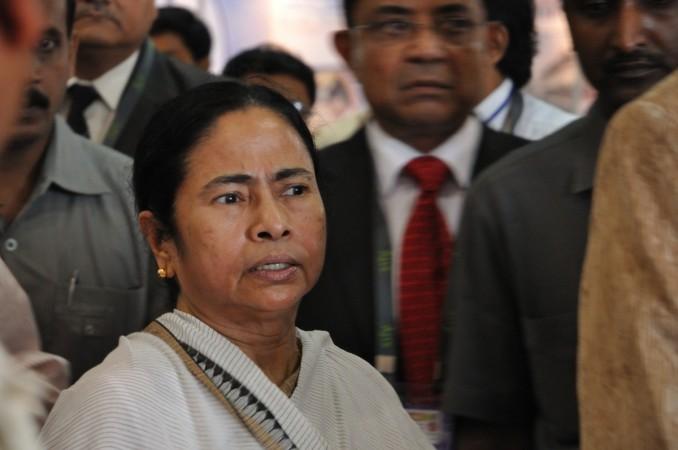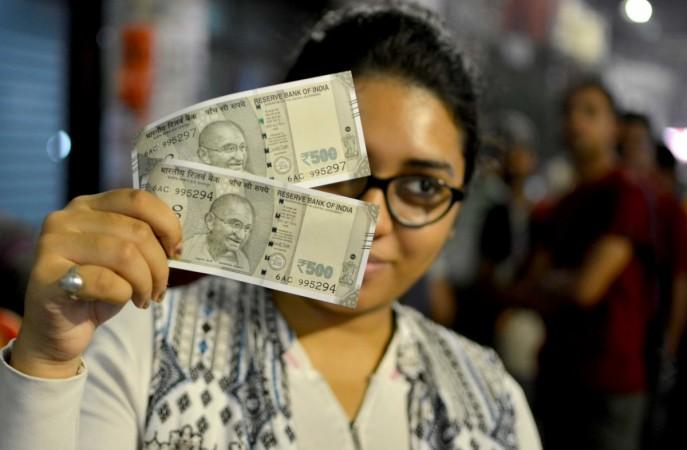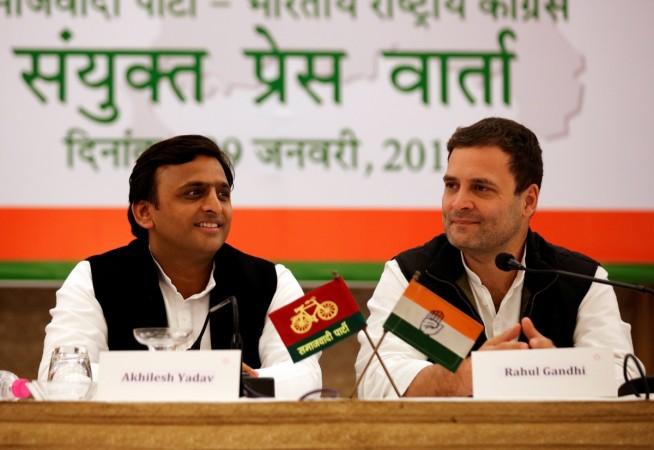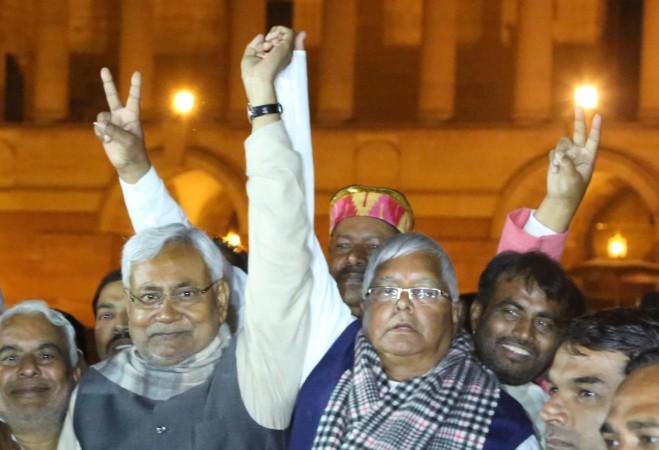
Prime Minister Narendra Modi and his BJP have virtually killed the anti-incumbency challenge even before two years of the next Lok Sabha election. The saffron brigade, after its fabulous show in the civic polls in Maharashtra and Delhi, the rural elections in Odisha and the high-profile Assembly elections in UP and Uttarakhand, has proved that it is the only viable political option for India at the moment. Modi is the only national leader after Indira Gandhi who has been ruling the country with such authority.
But if Modi is the new Indira, where is the contemporary Jayprakash Narayan? It was JP Narayan who had single-handledly inspired an opposition against Indira who was essentially India in the 1970s.
Despite his age, JP had given call for a total revolution against Indira Gandhi and played an instrumental role in forming a united opposition against the then powerful prime minister and it had eventually succeeded in toppling the Congress from power for the first time, in 1977. Indira had returned to power later but it was only after the death of JP.
Today, when political pundits are making in-depth analysis about the Modi phenomenon which has swept over the country, some thought is also needed to be spared for the Opposition. Why is it that the Opposition is not able to challenge Modi even if it is roaring often? There are quite a few seasoned leaders in the Opposition's rank who are even senior than Modi in national politics but yet they have not succeeded in finding a formula to beat Modi. Why?
There are two explanations to this. On one hand, PM Modi has proved himself to be smarter than the rest in the lot. He has not only proved himself as a leader of Indira's stature but at the same time, he has also appropriated the Opposition's space.
Or putting it in another way, many or most of Modi's vocal opponents have been rulers themselves in various states of the federalism and their ordinary track record as administrators have helped Modi's BJP rise as an alternative at the state levels, making Modi's image as the national ruler stronger. See the cases of Mamata Banerjee, Arvind Kejriwal, Akhilesh Yadav, Mayawati, Nitish Kumar or Naveen Patnaik – these leaders are seen as the main pillars of anti-Modi platform but their own dubious records in power have helped the BJP more.

The other aspect of the story is the Opposition's outdated politics. In 2015, after the Mahagathbandhan in Bihar defeated the BJP-led NDA, the anti-Modi forces tried to do a JP Narayan by vowing to challenge Modi from the famous Gandhi Maidan in Patna as the latter had done in June 1974 targetting the Indira regime.
But while focusing on the rhetorical part, the Opposition did not care for its own image. Aam Aadmi Party's Kejriwal was so carried away by Modi's loss that he hugged Lalu Prasad, the convicted politician, destroying his own legacy of a crusader against corruption. The BJP had lost in Bihar because of a combination of local factors and it was of little significance for national politics. The anti-Modi forces did not understand it and proved that they were unable to see the trees in the forest. It became established that the Opposition in India only knows to make noise – hollow noise.
The three main faces of anti-Modi politics: Mamata, Kejriwal and Rahul have failed to inspire
The leaders who were expected to bear the maximum responsibility in the anti-Modi crusade – Banerjee, Kejriwal and Rahul Gandhi – have miserably failed to live up to their expectations. These three leaders have made it a point to oppose Modi on every second issue – and that has in a way harmed their respective parties' prospects more than the BJP.
Take for example, the case of demonetisation. All the three leaders opposed the move but the BJP's massive victories in UP and Uttarakhand and also the Delhi civic elections in March and April dashed the trio's opposition. On the other hand, it is the BJP which has benefited more from the administrative and political failures of these three leaders (Rahul, however, is yet to prove his mettle as an administrator).

Only Nitish Kumar has shown some maturity
The only leader who has shown a mature opposition to Modi is Nitish Kumar. The Bihar CM did not go against the demonetisation as the others did but one feels the JD(U) strongman is not as powerful today compared to what he was even a few years back, the reason being his party's co-existence with the RJD in the government as the junior partner.
Nitish Kumar will remain busy to make his grip on his state's politics strong again and that might even see him returning to the NDA which he had left after Modi's elevation in its ranks in 2013. Hence, it is not yet clear whether Nitish would continue to remain in the Opposition in the days to come even though he met Congress president Sonia Gandhi on the upcoming presidential election to beat the BJP. Elements in Indian politics are too unpredictable.
India's Opposition refuses to change with time
Refusing to change with times is another drawback of India's Opposition. While they go on saying that Modi represents communalism, the reality is that India has changed much today and communalism-secularism debate isn't the main one anymore.

Today's youth want jobs and continuous feeding of their aspirations and Modi has done that even if he has not been able to create much jobs. But his opponents have failed to do even that. They speak the language of the politicians of the 1980s and 1990s; look more pretenders than genuinely representing people's aspirations while at the same time, play the minority communal card. What is worse is that the Opposition doesn't even realise what ails it. After losing elections, it blames voting machines and other factors. It shows that they are unable to read the nation's pulse.
The AAP, Trinamool Congress, Samajwadi Party, Bahujan Samaj Party and others essentially play the same old politics that the Congress had played over the decades to lead to its own downfall. There is clearly no fresh thinking to take on the new-age BJP which has outsmarted them both in style and substance.
The Opposition is too much disunited
Another shortcoming of the Opposition in India is its disunity. JP had succeeded in stitching up a unity in the Opposition's ranks with his influencing leadership. Then, Indira Gandhi was also a common enemy and it had helped forces to come together, at least till her defeat. Today, the regional satraps are not ready to bridge gap with their local enemies, even if it is required to take on a larger foe.

In Bihar, we saw Nitish and Lalu, the friends-turned-foes becoming friends again but the same was not replicated in states like UP or West Bengal. In the UP Assembly elections held earlier this year, the SP and BSP did not come together despite the threat called Modi and it showed in the final outcome. In Bengal, too, Banerjee has so far gone alone in the face of the growing clout of the BJP and nobody knows whether she would join hands with the Left and Congress as part of the anti-Modi ganging-up.
Moreover, the Opposition mostly come together in times of elections to target Modi but are not seen developing any strong alternative vision that could challenge Modi. This has also hurt their reliability.
As long as his opponents have no direction, Modi will have a smooth run
As of now, Modi is reaping the benefits of all these factors. He has also been shrewd enough not to give the Opposition any chance to make a dent into his run (be it in terms of corruption charges against either him or his party).
The last time India saw a majority government was under Rajiv Gandhi in 1984 but even his strong regime was decimated by the Bofors scam and VP Singh, who was Rajiv's own former finance and defence minister, made use of the opportunity to make his own fortune in politics. In Modi's regime, nothing of that sort has been seen and it is also very difficult to imagine any such possibility either.
Modi's stars are at their peak at the moment. It is virtually futile for the Opposition to try to find out a faulty with him by force now. Sometimes, it requires siding with the enemy and waiting for the right opportunity to strike. Till now, the Mamatas and Kejriwals have shown no such maturity of mind.

















